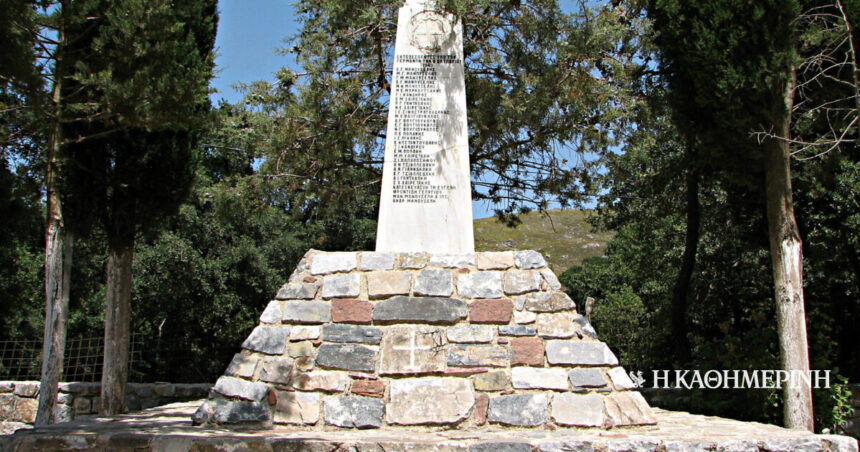After the surrender of the Italians to the Allied Powers in September 1943, the resistance groups operating in Greece were now focused on the German occupiers. On the part of the occupying forces, a new paramilitary body had been created in Crete which had complete freedom of action, with the aim of prosecuting the rebels and locating their weapons, the National Communist Pursuit Squad (EAKK) or Jagdkommando Schubert.
In this body, which was under his command, he was a lieutenant Fritz Schubert, only Cretans participated, who either declared themselves Germanophiles or had a personal vendetta with the leaders of rebel units. The “Soumberae” or “Sumberites”, as they were known to the Cretan population, were known for the brutal methods they used and became the fear and terror of the inhabitants.
After the Viannu holocaust from the Wehrmacht (September 14-16, 1943), which claimed the lives of 401 people, the guerrilla unit led by Manolis Badouva fled west, pursued by the Germans. Their plan was to reach the beach of Rodakinos, from where British secret service SOE (Special Operations Executive) would flee Badouva to Egypt. At the beginning of October, Batuva’s group was hiding in Mount Tsilivdika, at the foot of the White Mountains. In the meantime, he had been reinforced by two guerrilla groups, coming from Kallikratis Sfakion, under the orders of Nikos and Andreas Manouselis.
The presence of the rebels in Tsilivdikas was betrayed and thus German forces were sent to the scene.
The presence of the rebels in Tsilivdikas was betrayed and thus German forces were sent to the scene. The Greek resistance fighters managed to kill their persecutors. In retaliation for the deaths of the Wehrmacht men, the German commander of Crete, Bruno Breuer, ordered the destruction of the villages Kali Sikia and Kallikratis of Sfakionas the villagers had collaborated with the rebels.
Thus, after 12 women, including a pregnant woman, as well as an old man (the men had taken refuge in the mountains, anticipating German reprisals) were burned alive by Souberians in Kali Sykia, on October 6, the Germans headed for Kallikratis.
“On 6/10/43, a force of approximately Germans entered Kallikratin firing heavy shots to intimidate the inhabitants and prevent their escape”, says the Report of the Central Commission for the Determination of Atrocities in Crete, which was drawn up between July 29 and August 6 1945. “Nevertheless, most of the men managed to escape thanks to the mountainous and wooded area. The rest – about 30 men and women and children – were arrested and detained in the church’s precinct. Reinforced by the arrival of another army and the help of Schubert’s group, the Germans began to loot the village and interrogate the inhabitants, accusing them of collaboration after Baduva. Then, driven by this escape, they first killed about 10 men after terrible suffering in a ruined house, and the rest in the streets or in the courtyards of their houses.
“A total of 29 people were executed on 8/10/43, including the retired gendarmerie officer G. Manouselis after his son Emmanuel, the elders Man. Vougioukalos, 70 years old, Man. N. Manouselis 60 years old, Man. G. Manouselis 62 years old, Rus. Gantadakis 60 yrs., Emm. Konstantoudakis 60 yrs. Also the women Evag. widow Tsivoledakis 65 yrs., Zambia I. Papadosifou 50 yrs., M. Hairetaki 60 yrs., and Aikat. Giannakakis 30 years Also the brothers Alexandros, Nikolaos, Emmanuel and Manousos G. Vougioukalos, aged from 20 to 32 years.
“At the same time as the executions, they ransacked and then set fire to Kallikratin, burning about 80 of the houses. Of the women, they arrested 20 of all ages, whom they imprisoned for 1 month in Agia. Because after this a part of their army, heading south, came under a group of rebels, the Germans arrested three more women in the village of Kallikratis, murdered them inside a house and then blew it up. The area was declared a no-go zone, with an established and permanent outpost there, and the women and children dispersed to the mountains, forests and neighboring villages.”
The holocaust of Kallikrates did not go unpunished, as both Breuer and Schubert were executed in Greece. In fact, Schubert’s story is of particular interest. In the past, the prevailing version was that he was the son of the rich tobacco merchant from Smyrna, Spyridon Konstantinidis, who immigrated with his family to Germany during the Asia Minor Catastrophe. Today we know that Schubert was German, born on February 21, 1897 in Dortmund. He was a member of the National Socialist Party and the Wehrmacht.
The atrocities committed by Schubert in Crete and later in Macedonia were numerous.
At the beginning of the Occupation of Crete, he appeared in Rethymno as an interpreter for the German guard. He knew the Greek language well, which he spoke with a heavy accent, while he also knew Turkish, which made the Greeks give him the nickname “the Turk». He wore a Wehrmacht non-commissioned officer’s uniform and for a time had replaced Hartmann as head of the German counterintelligence network on the island.
The atrocities he committed in Crete and later in Macedonia were numerous. Nevertheless, he thought it a good idea to return to Greece after the end of the war: declaring the Greek name Petros or Takis Konstantinidis, he pretended to be a Greek concentration camp prisoner and on September 4, 1945 “repatriated” by the Allies. However, during the rudimentary control of the Greek authorities at Elefsina airport, Schubert raised the suspicions of the authorities and was even recognized by someone. During his interrogation he admitted his identity and was arrested.
Fritz Schubert was tried in the summer of 1947 by the Special War Crimes Tribunal and sentenced to death 27 times.
It is assumed that Schubert returned to Greece because of some love affair. On the other hand, he was not the only German who had returned to the scene of the crime. Perhaps he thought that post-December Greece was safer than occupied and divided Germany. Perhaps he still thought that his Greek collaborators could defend him.
Finally, Fritz Schubert was tried in the summer of 1947 by the Special War Crimes Tribunal and he was sentenced to death 27 times. He was executed on October 22, 1947 in Eptapyrgio prison in Thessaloniki. According to the then report of “Daily“, the royal commissioner Stavropoulos, addressing the executive detachment, said: “They are enlisting! About six years ago, the Greek weapons fell silent. Aunt Nemesis wanted them to be heard again today, punished and crowned with laurels. O innocent souls of the victims of this monster, at this moment they are wedged in the barrels of your weapons and they are waiting for you to shoot them in the form of a fireball into the heart of their hostage”.
Column editor: Myrto Katsigera, Vassilis Minakakis, Antigoni-Despina Poimenidou, Athanasios Syroplakis




